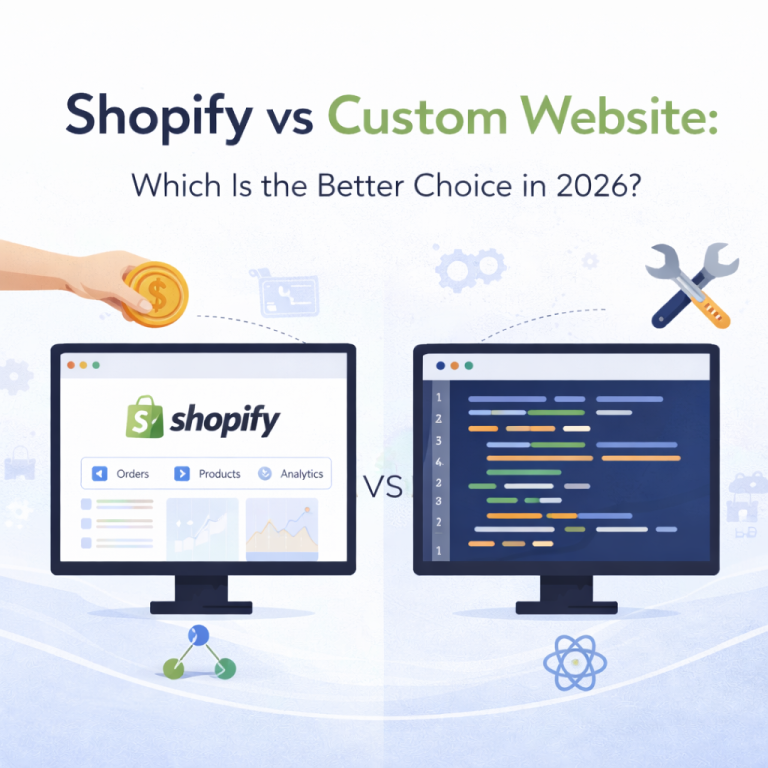Shopify is the better choice for most e-commerce businesses in 2026 because it offers faster launch, lower maintenance, built-in scalability, and a mature ecosystem designed for selling. A custom-built website only makes sense when you have very specific technical requirements, in-house development resources, and a clear reason to avoid a managed platform.
Why This Question Still Matters
This is one of the most common questions merchants ask before launching—or rebuilding—their store.
What we consistently see in practice:
- Many businesses overestimate the benefits of a custom site
- Many underestimate the operational cost of maintaining one
- Most don’t realize how far Shopify has evolved beyond “templates”
Choosing the wrong foundation doesn’t just slow you down—it compounds technical debt over time.
What “Shopify” and “Custom Website” Really Mean Today
Before comparing, let’s clarify terms.
Shopify
Shopify is a fully managed e-commerce platform that handles:
- Hosting
- Security
- Payments
- Performance
- Core ecommerce logic
You focus on selling and growth, not infrastructure.
If you’re unfamiliar with what Shopify actually includes today, this context matters.
Custom Website
A custom website usually means:
- Custom frontend (React, Vue, Next.js, etc.)
- Custom backend or headless CMS
- Third-party services stitched together
- Ongoing developer involvement
You gain flexibility—but also responsibility.
Shopify vs Custom Website: Core Comparison
Time to Launch
Shopify
- Launch in days or weeks
- Most e-commerce functionality is ready out of the box
Custom Website
- Weeks to months
- Requires planning, development, QA, and deployment
For most merchants, speed matters—especially early on.
Cost (Upfront and Ongoing)
Shopify
- Predictable monthly costs
- Optional app fees
- Minimal developer dependency
Custom Website
- High upfront development cost
- Ongoing maintenance and bug fixes
- Hosting, security, and performance costs add up
A common mistake we see is merchants comparing only launch cost, not total cost of ownership.
Flexibility and Customization
This is where custom websites are often assumed to win—but the gap is smaller than most think.
Shopify
- Custom themes
- Extensive app ecosystem
- APIs and headless options if needed
Custom Website
- Unlimited flexibility
- But every feature must be built, tested, and maintained
Unless you have a very specific technical constraint, Shopify usually offers enough flexibility without the overhead.
E-commerce Growth: Where Shopify Has a Clear Advantage
Running an ecommerce business is not just about launching—it’s about growing.
Shopify is built around:
- Conversion optimization
- Checkout performance
- Mobile-first UX
- Payments and trust
Features like cart optimization, upsells, and product grouping are much easier to implement in a mature ecosystem.
For example, many merchants eventually focus on increasing average order value (AOV) through bundles or quantity-based offers. On Shopify, this is part of the ecosystem—not a custom build.
When a Custom Website Actually Makes Sense
A custom website can be the right choice if:
- You are not primarily ecommerce-focused
- You need deep integration with proprietary systems
- You have an in-house engineering team
- You require non-standard checkout or workflows
- You are building a platform, not a store
These are edge cases—not the norm.
Common Mistakes Merchants Make When Choosing
We see these mistakes repeatedly:
- Choosing custom “for flexibility” without clear requirements
- Underestimating maintenance and dev costs
- Assuming Shopify can’t scale
- Overbuilding before validating the business
- Ignoring conversion and UX fundamentals
Most regrets come from choosing complexity too early.
Shopify Scalability: A Reality Check
Shopify is not just for small stores anymore.
It supports:
- High traffic volumes
- International selling
- Complex catalogs
- Advanced analytics
- POS and omnichannel commerce
Many merchants start small and scale without ever needing to migrate.
If you’re planning growth, understanding how Shopify supports long-term scale is important.
Internal link (sideways): How to Promote a Shopify Store: Best Strategies to Boost Sales
Frequently Asked Questions (FAQ)
Is Shopify better than a custom website?
For most e-commerce businesses, yes. Shopify reduces complexity and lets teams focus on growth instead of infrastructure.
When does a custom-built website make sense?
When you have unique technical requirements, strong development resources, and a clear reason to avoid a managed platform.
Can Shopify scale for large businesses?
Yes. Shopify supports high-volume stores, international markets, and complex operations.
Is Shopify more cost-effective long-term?
In most cases, yes—especially when factoring in maintenance, security, and development costs.
Can you customize Shopify like a custom site?
Within e-commerce needs, largely yes. For extreme customization, Shopify also supports headless setups.
Final Thoughts & Next Steps
The real question isn’t “Shopify or custom?”
It’s what lets you grow faster with less friction.
For most merchants in 2026, Shopify offers the best balance of speed, scalability, and ecosystem support.
If you’re evaluating platforms, your next step should be understanding how your store will convert, not just how it will be built.




